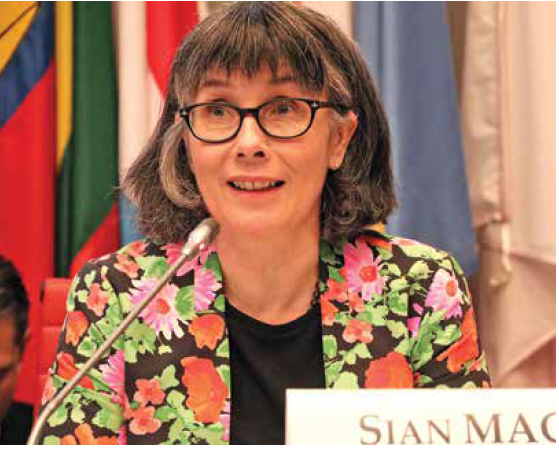This time around we have also asked the representatives of the authorities, diplomatic corps, international institutions, business associations, media and many others to express their views on the possible re-arrangement of power in the world, the European and regional political scene, the influences on Serbia’s accession to the EU, economic development, investments in culture, and as an inevitable question this year, elections which are taking place in many countries, including Serbia. We talked to H.E. SIAN MACLEOD, Ambassador of United Kingdom

The EU is facing Brexit and enlargement issues. What will be the outcome of the negotiations about a free trade agreement with the UK and how will the new accession methodology consolidate the EU and affect the Western Balkans?
The United Kingdom left the European Union on January 31st, in honour of the result of the 2016 referendum. After three years of very lively political debate in our country, we are now looking ahead and are focused on shaping our future. In the months ahead, we will continue to have a constructive dialogue about what our future relationships will look like. We are having this dialogue not only with the EU, but also with other countries, including Serbia. Our exit from the EU does not change the fact that Great Britain is committed to the prosperity, development and stability of the Western Balkans. Moreover, we have announced a significant increase in technical, political and financial support for the entire region. We see many opportunities for boosting our cooperation. We will continue to support the Government’s important digitisation and reform programme, which will improve the lives of ordinary citizens and the investment climate, as well as help the next generation to build a brighter future for their country. At the 2018 Western Balkans Summit in London, we announced the ambitious 21st Century School Programme, with the first results of the programme already visible. Under the auspices of this programme, all pupils from 1,150 elementary schools in Serbia will get their own microbit pocket computer, as well as support to master the basics of programming and develop critical thinking and problem-solving skills. We expect this programme to generate very positive social, technological and economic results in the period ahead. Since 2015, through its Good Governance Fund, Great Britain has supported more than 60 different projects in the segment of structural and economic reforms in Serbia. We are the largest bilateral donor to the e-Government programme. We also support the cadastre reform, the implementation of e-Baby service, reducing the number of NPLs and other projects aimed at developing better services for citizens and businesses in your country. We have invested over £20 million in these projects so far, and we will not stop at that. We have left the EU but we are not leaving Europe. I am pleased to see that both political and military contacts between Great Britain and Serbia have intensified. Prime Minister Brnabić was recently the guest of the EBRD Investment Summit in London. At Imperial College, one of the most prestigious universities in the world, she gave an inspirational lecture to young people, outlining Serbia’s ambitions regarding digitisation, technology and education. The Vice Chief of the Defence Staff of the United Kingdom Armed Forces, Admiral Fraser, visited Belgrade in late February. On that occasion, the two sides signed an agreement on bilateral military cooperation, stipulating as many as 33 joint activities in 2020. All of these examples that I cited are concomitant with my personal ambition as an ambassador to develop strong relationships focused on the future. Both Serbia and Great Britain are part of the European continent and we share a common interest in making Europe stable, secure and prosperous
Elections at different levels will take place in five Western Balkan countries in 2020, including Serbia, plus this is an election year in the United States. What trends can we expect to see in the light of these developments in Serbia, the Western Balkans and eventually in the world?
Independent, pluralistic media and free, fair elections are the basic pillars of a healthy democracy. It is up to political parties, potential candidates and citizens of Serbia to decide whether they are going to participate in the election, while the Government has a duty to create conditions for fair and free elections in accordance with international democratic standards endorsed by Serbia too. In the light of the upcoming elections in Serbia, it is not up to me, as an ambassador of a foreign country, to tell parties, politicians or voters what they should do. I keep saying that when elections are held in my country, as a citizen, I want to be free to choose between different policies, platforms and candidates. I want to have free access to the views they represent through free media. I would also like to highlight the role of our public broadcaster (the BBC), as an impartial source of information. The importance of public access to information is stipulated in international obligations, which of course, imply the public’s right to be truthfully informed.